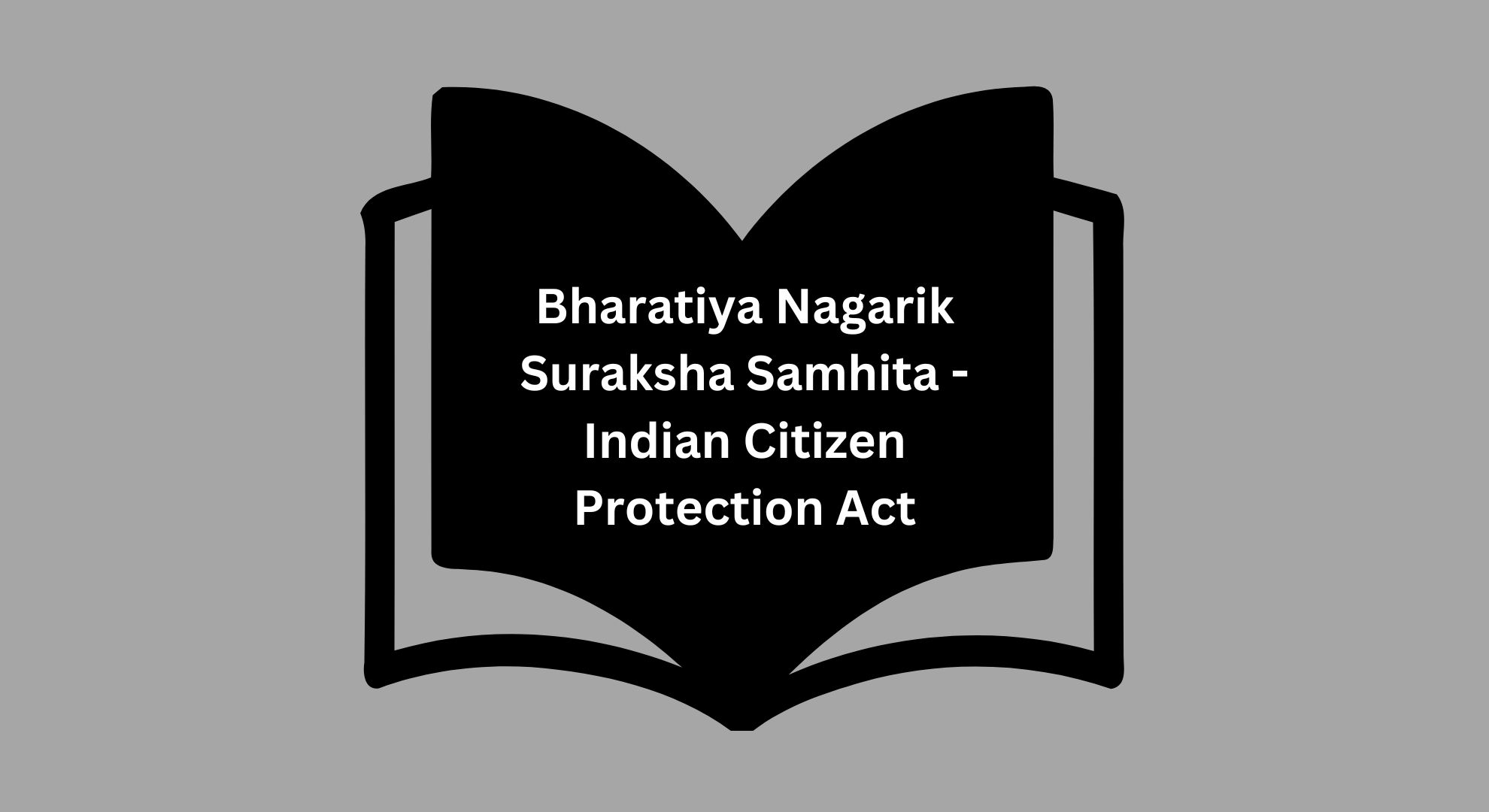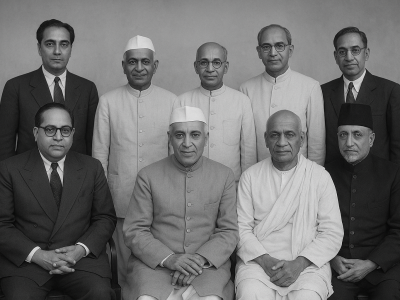Understanding the Bharatiya Nagarik Suraksha Samhita(BNSS) - Indian Citizen Protection Act()

On 25th December 2023, India marked a significant milestone in its legislative history with the enactment of the Bharatiya Nagarik Suraksha Sanhita (BNSS). Replacing the century-old Indian Penal Code (IPC) and the Code of Criminal Procedure (CrPC), the BNSS represents a comprehensive overhaul of the nation's criminal law framework. This article delves into the background, key changes, and the implications of this landmark legislation.
Background and Timeline of Bharatiya Nagarik Suraksha Samhita
The journey of the BNSS began on 11th August 2023, when the Home Minister, Amit Shah, introduced the Bharatiya Nagarik Suraksha Sanhita Bill, 2023 in the Lok Sabha. The bill aimed to modernize and streamline India's criminal justice system, addressing issues that had long plagued the IPC and CrPC. Here is a brief timeline of the key events leading to the enactment of the BNSS:
11 August 2023: Amit Shah introduces the Bharatiya Nagarik Suraksha Samhita Bill, 2023 in Lok Sabha.
12 December 2023: The original bill is withdrawn.
12 December 2023: The Bharatiya Nagarik Suraksha (Second) Samhita Bill, 2023 is introduced in Lok Sabha.
20 December 2023: The bill is passed in Lok Sabha.
21 December 2023: The bill is passed in Rajya Sabha.
25 December 2023: The bill receives the assent of the President of India, becoming law.
Key Changes Introduced by the Indian Citizen Protection Code
The BNSS makes several significant changes to the criminal law framework, focusing on consolidation, simplification, and the enhancement of the rights of the accused. Here are some of the major changes:
Consolidation and Simplification of Law
One of the primary goals of the BNSS is to consolidate and simplify the existing laws. This involves repealing and amending various provisions of the CrPC to make the legal process more straightforward and accessible.
Strengthening the Rights of the Accused
The BNSS introduces several safeguards to strengthen the rights of the accused, including:
Right to a Lawyer of Choice: The accused can choose their lawyer during interrogation.
Right to Information: Arresting officers must immediately inform the arrested person of the full particulars of the offence or the grounds for arrest.
Medical Examination: The arrested person must be examined by a medical officer soon after the arrest.
Improving Efficiency in the Criminal Justice System
To address the issue of delays and inefficiencies, the BNSS introduces measures to streamline procedures:
Expanded Grounds for Arrest: The Indian Citizen Protection Code expands the grounds for arrest and allows for arrest without a warrant in a wider range of cases.
Investigation Timeframes: Police are required to complete investigations within a specified period.
Streamlined Trial Process: Courts are mandated to dispose of cases within a specified timeframe.
Specific Changes in the BNSS
Offences Against the Body
The BNSS retains many provisions from the IPC regarding serious offences such as murder, abetment of suicide, assault, and causing grievous hurt. Additionally, it introduces new offences, including:
Organized Crime: Specific provisions to tackle organized criminal activities.
Terrorism: Enhanced measures to deal with terrorism.
Group Violence: Provisions addressing murder or grievous hurt by a group on certain grounds.
Sexual Offences Against Women
While retaining the IPC provisions on rape, voyeurism, stalking, and insulting the modesty of a woman, the BNSS makes significant changes, such as:
Increased Age Threshold: The age for classifying a gang rape victim as a minor is raised from 16 to 18 years.
Offences Against Property
The BNSS retains existing provisions on theft, robbery, burglary, and cheating, and introduces new categories of crimes, including:
Cybercrime: Specific provisions to tackle crimes in the digital realm.
Financial Fraud: Enhanced measures to combat financial fraud.
Offences Against the State
One of the most notable changes is the removal of sedition as an offence. Instead, the BNSS introduces a new offence for acts endangering India's sovereignty, unity, and integrity.
Offences Against the Public
The BNSS addresses modern societal concerns by adding new offences such as:
Environmental Pollution: Provisions to penalize activities causing environmental harm.
Human Trafficking: Specific measures to combat human trafficking.
Criticism and Concerns
Despite its comprehensive nature, the Indian Citizen Protection Code has faced criticism on several fronts:
Marital Rape Exception: The BNSS retains the controversial marital rape exception, which many believe should be abolished.
Gender-Specific Language: The retention of phrases like ‘outraging the modesty of women’ instead of gender-neutral terms like ‘sexual assault’ has drawn criticism.
Digital Privacy Concerns: Provisions allowing police to compel the accused to produce digital devices for investigation purposes have raised concerns about privacy rights.
Property Seizure Before Trial: The ability of police to seize and attach property of the accused before trial has also been contentious.
Ambiguity in Sovereignty Offence: The new offence for acts endangering ‘sovereignty or unity and integrity of India’ is seen as vague and potentially suppressive of free speech and dissent.
Structure of the BNSS
The BNSS is organized into 20 chapters and 358 sections, maintaining a structure similar to the IPC. Here is an outline of its structure:
- Chapter 1: Preliminary (Clauses 1 to 3)
- Chapter 2: Of Punishments (Clauses 4 to 13)
- Chapter 3: General Exceptions of the Right to Private Defence (Clauses 14 to 44)
- Chapter 4: Of Abetment, Criminal Conspiracy and Attempt (Clauses 45 to 62)
- Chapter 5: Of Offences against Women and Children (Clauses 63 to 97)
- Chapter 6: Of Offences Affecting the Human Body (Clauses 98 to 144)
- Chapter 7: Of Offences Against the State (Clauses 145 to 156)
- Chapter 8: Of Offences Relating to the Army, Navy and Air Force (Clauses 157 to 166)
- Chapter 9: Of Offences Relating to Elections (Clauses 167 to 175)
- Chapter 10: Of Offences Relating to Coins, Bank Notes, Currency Notes and Government Stamps (Clauses 176 to 186)
- Chapter 11: Of Offences Against the Public Tranquility (Clauses 187 to 195)
- Chapter 12: Of Offences by Or Relating to Public Servants (Clauses 196 to 203)
- Chapter 13: Of Contempt of Lawful Authority of Public Servants (Clauses 204 to 224)
- Chapter 14: Of False Evidence and Offences Against Public Justice (Clauses 225 to 267)
- Chapter 15: Of Offences Affecting Public Health, Safety, Convenience, Decency and Morals (Clauses 268 to 295)
- Chapter 16: Of Offences Relating to Religion (Clauses 296 to 300)
- Chapter 17: Of Offences Against Property (Clauses 301 to 332)
- Chapter 18: Of Offences Relating to Documents and Property Marks (Clauses 333 to 348)
- Chapter 19: Of Criminal Intimidation, Insult, Annoyance, Defamation, Etc. (Clauses 349 to 356)
- Chapter 20: Repeal and Savings (Clauses 357 to 358)
The Bharatiya Nagarik Suraksha Samhita represents a bold step towards modernizing India’s criminal law. By consolidating and simplifying the law, strengthening the rights of the accused, and addressing contemporary crimes, the BNSS aims to create a more efficient and fair criminal justice system. However, the criticisms and concerns raised highlight the ongoing challenges and debates in balancing legal reforms with human rights and freedoms.
As the Indian Citizen Protection Code takes effect, its impact on India’s legal landscape will be closely watched. Whether it succeeds in achieving its goals while addressing the concerns raised will determine its effectiveness and legacy in the years to come.








